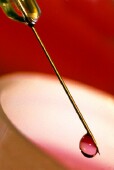
THURSDAY, Oct. 18 (HealthDay News) — The effort to develop a blood test to reveal a woman’s risk for breast cancer may be one step closer to fruition, but is still far from becoming a reality, according to a new study.
The researchers found that blood hormone tests may predict the risk for developing postmenopausal breast cancer up to 20 years after a blood sample was taken.
But the study has limitations and needs to be replicated and expanded, said Dr. Xuehong Zhang, lead author and an epidemiologist at Brigham and Women’s Hospital in Boston.
If the research is confirmed by other studies, women could have their blood levels of so-called “sex hormones” such as estradiol, testosterone and the androgen DHEAS (dehydroepiandrosterone sulfate) assessed every 10 to 20 years to get a biological assessment of their breast cancer risk, Zhang explained.
“We’re thinking that the addition of hormone levels to our current risk prediction models might improve our ability to find high-risk women who would benefit from additional screening or prevention,” he said.
The research was scheduled for presentation Thursday at the annual cancer prevention conference of the American Association for Cancer Research (AACR) in Anaheim, Calif.
Although it has been established that levels of estrogen and androgen in the blood can be associated with the risk of postmenopausal breast cancer, researchers haven’t known how far into the future that risk prediction might go, Zhang said.
Working with participants in the Nurses’ Health Study, a large and long-running effort to study women’s health issues, blood samples were collected in 1989 to 1990, and then again in 2000 to 2002. Only postmenopausal women not taking hormones were eligible for this study. The researchers found 796 cases of diagnosed breast cancer through June 2010.
The study showed that women with hormone levels in the top quarter for estradiol, testosterone and DHEAS had a 50 percent to 107 percent greater chance of developing breast cancer as compared to women in the lowest quarter. Elevated hormone levels were also associated with recurrent or fatal breast cancer.
Those women in the highest quarter for sex hormone-binding globulin (SHBG) — which has been understood to reduce the cancer-causing effects of some hormones — had a 30 percent lower risk for breast cancer compared to those with SHBG levels in the lowest quarter.
The researchers also found that elevated levels of estrogen increased a woman’s risk for hormone receptor-positive breast cancer.
Tests for the levels of these hormones are available now, but the results are often uncertain because laboratories vary greatly in how they define and interpret the results, Zhang said.
A breast cancer expert urged caution in interpreting the study.
“I would ask, if you’re postmenopausal and have elevated levels of these hormones, should you potentially turn off your body’s hormones [to help prevent breast cancer]?” asked Dr. Julie Gralow, director of breast medical oncology at the Seattle Cancer Care Alliance.
“If the hormones are good for your bones, your heart and maybe the brain, should you do anything to reduce them if you’re perceived to be at some increased risk? It could affect your health negatively [to try to reduce those hormone levels],” Gralow said.
Should such a blood test become available, Gralow said she would want women to balance their potential risk of breast cancer against the danger of other diseases and conditions, including osteoporosis and fractures, heart disease and even dementia. “This is an interesting finding that needs to be put into the perspective of the total health of the postmenopausal woman,” she said.
Risk factors for breast cancer currently include aging, genetics, race and ethnicity, family history and a personal history of breast cancer, among others, according to the American Cancer Association.
Because this study was presented at a medical meeting, the data and conclusions should be viewed as preliminary until they are published in a peer-reviewed journal.
More information
Learn more about breast cancer risk factors from the American Cancer Society.

